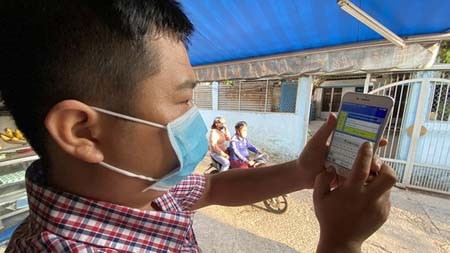
Recently, cyber attacks have aimed at people conducting online transactions, with the popular trap of sending a link in a message for victims to click and then fill in a form, after which their Internet Banking account will be stolen. The unavoidable result is financial loss.
The Authority of Information Security under the Ministry of Information and Communications reveals that cyber frauds always account for a large percentage of all cyber attacks to information systems in Vietnam. Particularly, among the 571 attacks in Vietnam in the first 2 months of 2020, 383 were cyber frauds, making up nearly 67 percent. In 2018 and 2019, the rate were 58 percent and 61 percent, respectively.
Therefore, many banks in Vietnam like Nam A Bank, Maritime Bank (MSB) have delivered a formal warning to all clients. They warn that cyber criminals might embed malware inside a file with information or updates about Covid-19, which are sent through SMS, emails, social network applications, or even similar hotlines to those of renowned banks. If receivers open a mail or click on a link, their smart devices are immediately infected and their sensitive information stolen.
In the end of February 2020, Vietcombank warned its customers of cyber frauds via fake websites such as vietcombankwubank.weebly.com; vietcombankvnk.weebly.com; vietcombank-dv-nhanh.weebly.com; ngan-hang-vcb-online-247-nhan-tien-quoc-te.weebly.com
Via these websites, criminals can steal all necessary related to Internet Banking of clients to take away their money.
Other criminals fake a bank officer and announce that a victim wins a prize of the bank or receives money from their relatives abroad, then ask for the victim’s sensitive information like account name, password, OTP code, card information. These valuable data are then used to steal the victim’s money.
Some cyber criminals even ask victims to install an app onto their smart devices, especially the ones running Android OS, for ease of financial stealing.
The Authority of Information Security affirmed that along with the blooming of technologies in Industry 4.0, cyber vulnerabilities increase by 300 percent each year. Among them, those related to bank and baking activities are the most lucrative ones to use.
Therefore, to minimize potential money loss, Nam A Bank suggests that people should not enter sign-in password or OTP code in websites with unclear origin; should not give security information of their Mobile Baking, Internet Banking, Openbanking as well as content of banking SMS to anyone, even to those saying that they are police officers, inspectors, bank officers.
Customers are also advised not to display their transaction information online or to conduct transactions via the Internet using public devices or to save information for automatic sign-in processes anywhere.
In its warning notice, Vietcombank clearly states that it has never sent any link or contacted customers to ask for sign-in information to any service, OTP codes, or personal information in any form.
It recommends that clients frequently change their sign-in password (at least once every 3 months), not sign in their account from unknown devices or websites, and only carry out online transactions on official websites of renowned shops.
























